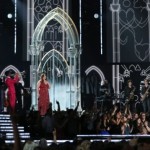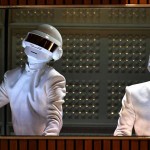The Feedback Loop is a weekly column by Luke Larsen that seeks to find God amidst the newest trends in both mainstream music and independent music.
Technology, especially with regard to human development and evolution, is often used as a means of organizing and making sense of life. It’s meant to give us more efficiency, more control. But at what point do we start losing control to that technology?
That is the question Ctrl sets out to explore. But Derek Webb doesn’t address the hotly-debated topic in a set of direct statements like he might have in a previous album. Rather, he has a story to tell. In fact, the story behind the album goes back to earlier this year, when a mysterious project called SOLA-MI surfaced across the web.
Although it was touted as the official soundtrack for a movie called Nexus, this supposed film didn’t seem to exist in much of any capacity. Mysterious coffee shop postings and a trail of Twitter hints eventually led to the release of a free album from SOLA-MI — an electronic indie pop album that fits sonically somewhere between Janelle Monae and Sufjan Stevens.
SOLA-MI dives into the existential crisis of an artificial intelligence on the verge of human consciousness. In “Mother, Mother”, vocalist Latifah Philips takes the embodies the voice of the machine:
How do you dig yourself out from the grave
With no hands and no face and no name?
How do you really know what you really know
If you don’t really know how you know it?
Is it faith or is it computation?
Transistors exploding
The “mother”, this machine’s creator, is referred to often throughout the album — a transcendent metaphor on the relation between creation and creator.
In the album’s final song, “Silver Grizzly”, we find our synthetic heroine begging her mother for real life as her beeping heartbeat fades into a flatline. But who is this mysterious artificial intelligence and where did she come from?
Ctrl is the answer to that question. The album tells the poignant backstory of the creation of this artificial intelligence that the protagonist of Ctrl manufactures in the song “Pressing On The Bruise”:
You’re pressing hard against the glass
A pioneer with a pale face
You want her just so bad
So you’re all wrapped up in wires
Squinting eyes for a way through
However, the integration of man and machine doesn’t end up giving the character the control he is looking for.
The album opens with the breathtaking track “And See The Flaming Skies”, a woeful psalm of judgement that introduces the listener to both the life of despair the character finds himself in and the sounds of the majestic church choirs that fill the record. It’s one of the most powerful tracks on Ctrl and Webb’s setting of these choirs against a quiet acoustic guitar and a programmed beat feels almost strangely sacred. It’s a particularly inspired choice that perfectly embodies the themes of human consciousness and technology.
The story that Ctrl tells might disguise itself in the form of science fiction, but it feels close to home. I think the reason is because, in some ways, it’s the story of Adam and Eve and the Fall — the story of choosing to be an equal of your creator and to attain a level of consciousness that can’t be reversed. But Webb’s parable is less about technology and more about choosing control over faith. It is a prophetic warning against chasing our lust for control, but also an invitation to find life in giving it away — not trying to stay in command of it.
















